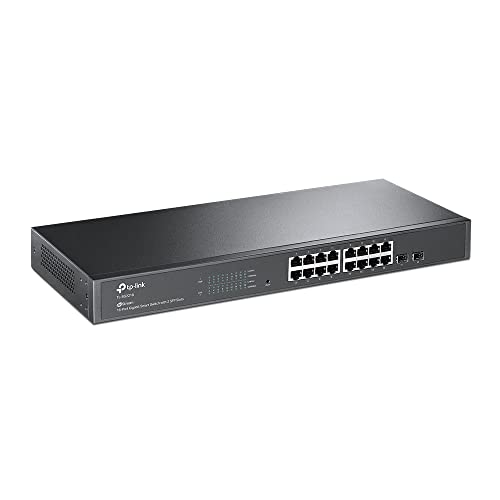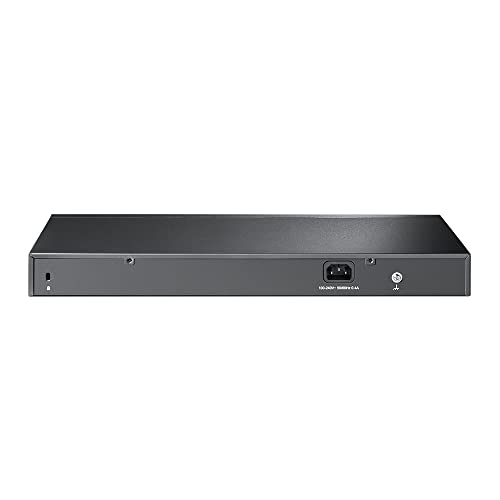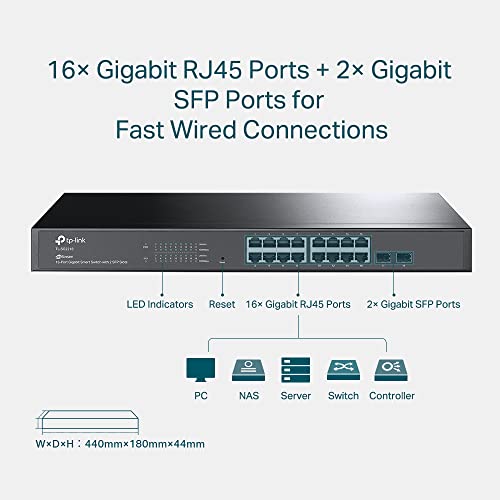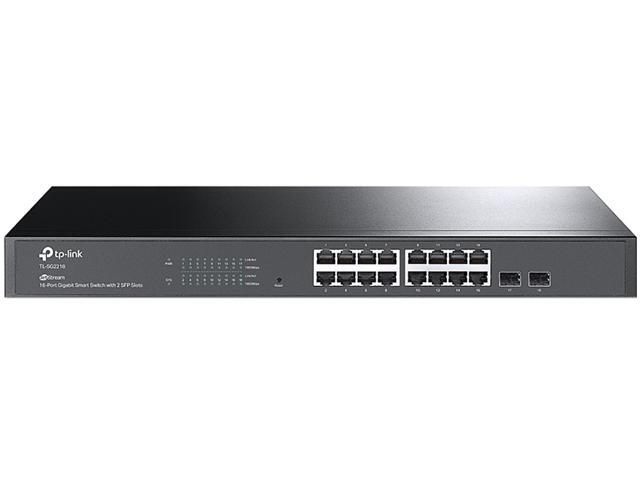TP-Link 16-Port Gigabit Smart Switch
Set Lowest Price Alert
×
Notify me, when price drops
Set Alert for Product: TP-Link TL-SG2218 | 16 Port Gigabit Smart Managed Switch, 2 SFP Slots | Omada SDN Integrated | IPv6 | Static Routing | L2/L3/L4 QoS, IGMP & LAG | 5 Year Manufacturer Warranty - $139.99
Last Amazon price update was: January 7, 2025 21:07
×
Product prices and availability are accurate as of the date/time indicated and are subject to change. Any price and availability information displayed on Amazon.com (Amazon.in, Amazon.co.uk, Amazon.de, etc) at the time of purchase will apply to the purchase of this product.

TP-Link 16-Port Gigabit Smart Switch
Original price was: $149.99.$139.99Current price is: $139.99.
TP-Link 16-Port Gigabit Smart Switch Price comparison
TP-Link 16-Port Gigabit Smart Switch Price History
Price History for TP-Link TL-SG2218 16 Port Gigabit Smart Managed Switch, 2 SFP Slots Omada SDN Integrated IPv6...
Statistics
| Current Price | $121.11 | October 20, 2024 |
| Highest Price | $121.11 | October 20, 2024 |
| Lowest Price | $121.11 | October 20, 2024 |
Since October 20, 2024
Last price changes
| $121.11 | October 20, 2024 |
TP-Link 16-Port Gigabit Smart Switch Description
- 【Flexible Full Gigabit 18-Port Configuration】16 × 10/100/1000 Mbps RJ45 ports, together w/ 2× Gigabit SFP slots provide high-speed and reliable connections.
- 【Support Omada SDN】Omada Software Defined Networking platform integrates network devices, including switches, APs & gateways with multiple control options offered – Omada Hardware controller or Software Controller. Standalone Mode also applies.
- 【Cloud Access】Remote cloud access and Omada app brings centralized cloud management of the whole network at different sites-all controlled from a single interface anywhere, anytime.
- 【SDN Compatibility】Make sure your devices/controllers are equipped with SDN firmware. (Or upgradable). SDN controllers work only with SDN Access Points, Switches & Gateways. Non-SDN controllers work only with non-SDN APs. Details found on TP-Link website.
- 【Enhance Network Security】Advanced security features include 802.1Q VLAN, IP-MAC-Port binding, ACL, Port Security, DoS defend, Storm control, DHCP Snooping, 802.1X radius authentication and more.
- 【Advanced Software Features】Prioritize your traffic and guarantee high quality of video or voice data transmission with L2/L3/L4 QoS, IGMP Snooping, Link Aggregation and Flow Control.
- 【5 Years Warranty】Backed by our industry-leading 5-years warranty and free technical support from 6am to 6pm PST Monday to Fridays, you can work with confidence.
TP-Link 16-Port Gigabit Smart Switch Specification
Specification: TP-Link 16-Port Gigabit Smart Switch
|
TP-Link 16-Port Gigabit Smart Switch Reviews (13)
13 reviews for TP-Link 16-Port Gigabit Smart Switch
Show all
Most Helpful
Highest Rating
Lowest Rating
Only logged in customers who have purchased this product may leave a review.






















Quantum Energy –
A fair bit of learning is needed for setup.
Has a lot of advance capability like DHCP pooling that works so much better than DHCP built in to your Internet modem.
Not all features can be setup over the cloud. When you remove the cloud access the switch resets to factory condition.
The SFP+ modules do not auto configure, you must select 1000M or 10 G manually. The SFP+ ports work with SFP modules that are not TP LINK branded. I used the SFP ports to run optical cable to distant parts of the home.
Peter Banish –
Got this switch to work with TP-Link’s OC200, ER7206 and APs through TP’s Omada cloud based network management. I had to contact tech support to properly adopt the switch because my configuration is tricky with a lot of VLANs and net segmentation. It needs DHCP on the VLAN to properly adopt; afterwards, you can assign a static address and disable DHCP. After an hour of tech support and a firmware update out of the box, it has been dead reliable and easy to manage. It has every feature you’d want in a switch and when connected to Omada, insanely easy to manage.
Wade –
I first bought a TL-SG2428P, not realising how crazy loud & annoying the fans were. Though I did want the PoE functionality, it wasn’t worth the noise. So I got this model (TL-SG3428) instead and haven’t looked back. Granted, PoE functionality has to be added on separately, but there are lots of fanless options for that.
It’s run for months now without any problems. I manage it directly using its built-in web server, and in a minor way via SNMP. Everything works well. The web GUI is similar to other contemporary TP-Link switches & routers. It’s a little hard to find things sometimes – there’s so many configuration options, and it’s not always intuitive as to where they are in the navigation hierarchy.
Overall I’m really happy with it. I think it’s good value too, compared to the other options I’ve been able to find.
bluewanderer –
Switch seems fine. Good standard management features.
I got a v 1.0 hardware
It appears to be that some Jetstream devices have USB console drivers that are not included in Linux, and the windows driver is not signed, and not auto-installed. This made me look at my other devices and I found two out of seven devices had this issue, including one of two with the same model number.
Probably due to the older hardware version. Waiting to hear back from TP-Link support.
Not a huge deal as you can use the included serial console port/cable if you have a supported Com port.
EDIT: TP-Link support looked into this issue, seemed to spend a lot of time with it, but is acting like it is a non-issue. To be fair, you can still use the serial console cable and a separate usb serial device.
Mahigan –
I bought this switch in order to replace a 48 Port with SFP switch. This switch is in another room and it aimed at providing connection to mainly retro PCs. The SFP+ ports let me bring in 10Gbps using OM3 LR MM Fiber cabling.
The switch is completely silent (no fans) and even with two 10 Gbps Multimode Modules installed next to one another, no heat detected other than lukewarm above the ports.
My Omada controller picked it up immediately. I adopted it. I then updated the firmware from 1.0.7 to 1.0.12. Configured the VLANs and it’s up and running. Very easy.
This is a good switch for the price.
Skip –
Perfect for a Prosumer especially with the OC200 Omada Controller. Highly recommend .
Robin Green –
I am upgrading my home network. First I added an Omada Wifi Access Point setup to support four VLANS. Easy peasy. Next, I added this switch, but the initial configuration is a little more difficult since the switch has to support a much larger feature set. The GUI is relatively easy to use, but I couldn’t get my VLANs working. After a few days of frustration, I decided to try out TP-Link’s online chat support. My agent was XANDREX. In just a few minutes, they helped me determine that what step in the process I missed and boom! Everything works great!
So far, I am really happy that I chose Omada over Unifi – easier implementation and great online support. Oh, and when I am ready, I can run the Omada Controller that will allow me to manage all my devices from a single plane of glass. Nice!
Rich Roberts –
The Omada SDN makes this switch Awesome
Brian –
I recently upgraded my home office network infrastructure, and the TP-Link TL-SG2008 has been a game changer. Moving from a Nighthawk CAX80 to this smart switch has significantly improved my network capabilities. The setup was straightforward, and it integrates seamlessly with my TP-Link Omada system. The network throughput is much better, and I now have a stable and reliable connection across all my devices. This switch handles all my traffic efficiently, and the management features are top-notch. Highly recommended for anyone looking to enhance their network performance!
Amazon Customer –
Port speeds as advertised. But please avoid if at all your budget allows. Dlink or Huawei is better.
Jetstream advertises a lot of features but there are strange quirks of the system. CLI is similar to Cisco with a few differences. A lot of port settings eg VLANs, Interface settings, etc simply do not work properly. Is it a genuine struggle to set it up as per expectations.
10G randomly decides to switch to 1G. A switch reboot is needed to fix. No amount of config changes on the switch or connected server changes the link speed.
S –
The switch works great. I replaced a HP Procurve with this because the fans on the Procurve were were just too loud and I didn’t even utilize half of the 24 ports on it. The SG2008 works great with the Omada software controller and is super easy to manage. It does seem to lose some settings when using the controller instead of the standalone web interface but it still allows sufficient configuration for my home network with multiple VLANs. I am happy enough with this switch and the whole Omada ecosystem that I plan to get the SG2008p to add to the setup.
Thomas Sapiano –
Most affordable switch with a 10G uplink that I could find. With four SFP+ ports you can avoid bottlenecks by having a 10G link back to the router and connect a small number of 10G devices without spending a pile on a full set of 10GBaseT ports being wasted by gigabit devices. That is surprisingly rare in the current market with most vendors having nothing between expensive full 10G switches and simple 1G switches.
L2+ features are extensive and cover all of my needs, and the built-in administrative interface makes it easy to configure. I haven’t tried the Omada controller yet as I’m running a mostly Ubiquiti setup and didn’t want to fool around with a second controller, but thankfully that’s optional with this device so it works well on its own. Build quality is excellent and its fanless design is nice and quiet. Currently using it with a fiber uplink to my router and two copper SFP+ modules for a workstation and server with throughput right up at the rated numbers when I push.
Only con I can think about is that it’s very slow to start up, but that’s a rare occurrence so not much of an issue.
Beau Steward –
In my switch (heh) over to TP-Link and Omada management, I discovered this as a good replacement for the switch at my desk, where things at my desk connect to my network. It replaced a 7 port unmanaged switch of another brand and I was happy that it wasn’t all that much bigger. Having some management means I can test some extra things out and use it in other ways, and I get an extra port. Most importantly, devices connected to it, through my other Omada 2.5G switch, and to my gigabit internet get the full gigabit internet speed.
As of now, I don’t need a 2.5G switch in this place, so the gigabit speed is fine.
Overall satisfied. Will keep things going in this ecosystem.